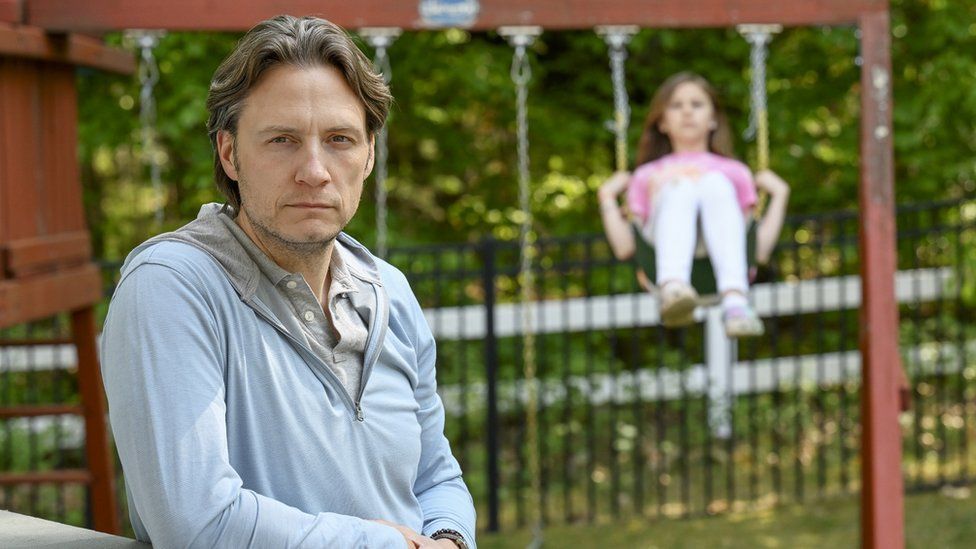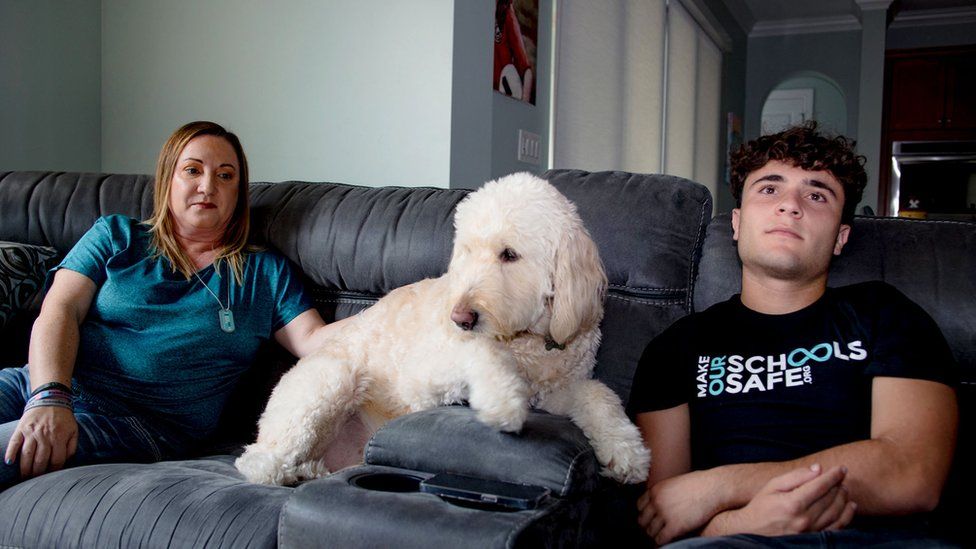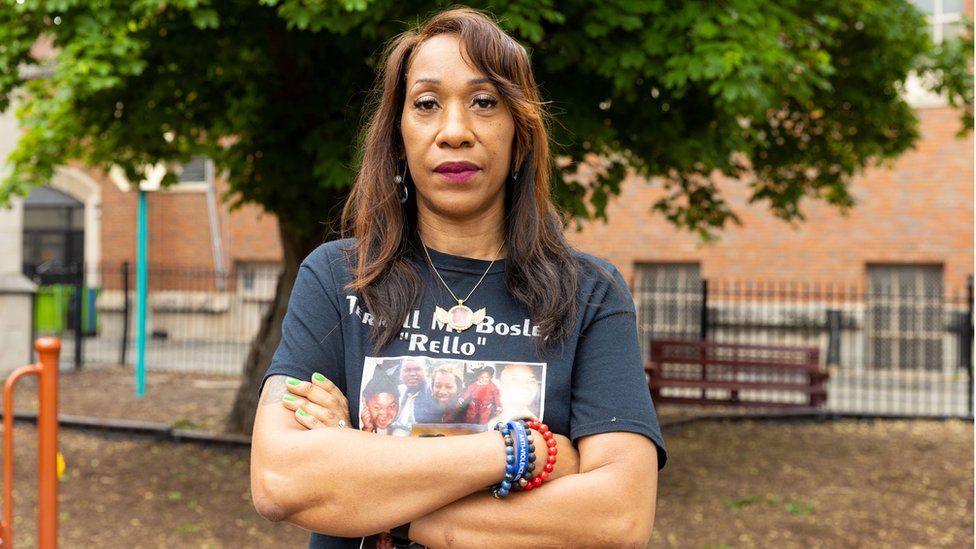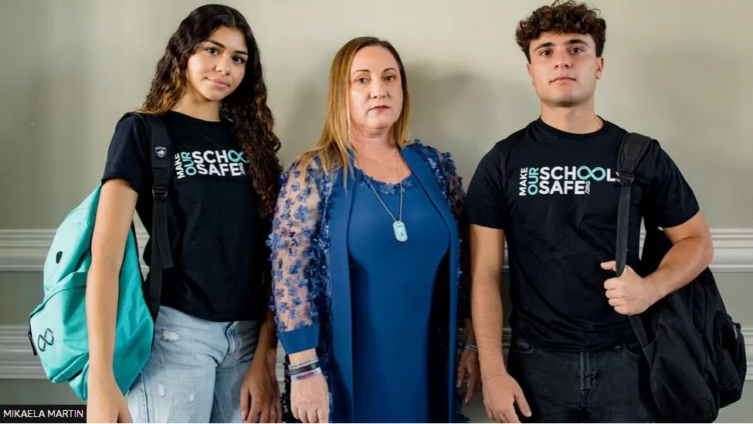As gun violence increases and shootings seem to make headlines every few days, the fear of getting caught up in one is changing the lives of millions of Americans.
A shopping mall. A classroom. A teenager's house party.
All have suffered the scourge of a US mass shooting in recent weeks.
To many Americans, it feels like it could happen anywhere.
As National Gun Violence Awareness Day looms on Friday, how is this issue affecting the way people go about their lives?
Tough conversations
Around 60% of adults say they have talked to their kids or other relatives about gun safety, according to a survey by the Kaiser Family Foundation.
Some of these conversations are sparked by lockdown drills in US classrooms. In some cases, students as young as five are taught when to barricade doors and when to run for their lives if a gunman is prowling the corridors.
Recently, Morgan Hook's nine-year-old daughter Elise came home from school and took her family by surprise when she said the drills would not be much use if the gunman just shot down the door.

Mr Hook tried to reassure his daughter that wouldn't happen, but he thought back to a recent shooting at a private school in Nashville when the suspect did exactly that.
"Sometimes when you try to comfort your kids, that means you're lying to them," says Mr Hook, who lives in Saratoga County, New York.
It's useful for parents to have conversations with their children about gun violence, provided they do so calmly, says Vaile Wright, the senior director of health care innovation with the American Psychological Association.
Moving home
Gun violence in the US has at times caused some to uproot their lives. About 15% say they've moved to a different neighbourhood or city because of it, according to Kaiser.
Last year, 40-year-old Travis Wilson and his wife moved to a new neighbourhood in Louisville, Kentucky, after moving from Old Louisville where they counted the number of gunshots at night.
A bullet once went through his neighbour's window. Another time someone pulled a gun on him in front of his house. After his daughter was born in 2021, he and his wife started re-evaluating.
"I couldn't imagine how any child could grow up in an area where they hear frequent shots and not be dramatically affected," he said.
But last month, the violence followed him to his new neighbourhood when a gunman killed five former co-workers at a local bank.
Mr Wilson said he sometimes feels irresponsible raising a child in America, where nowhere feels perfectly safe.
"I'll never forgive myself if [my daughter] is a victim of a shooting and I just waited around for her turn."
Bulletproof backpacks

On Valentine's day five years ago, Lori Alhadeff sent her three children to school as she did every other morning, but by the day's end, only two made it home.
A teenage gunman shot and killed 17 people at a high school in Parkland, Florida, including Ms Alhadeff's 14-year-old daughter Alyssa.
After the shooting, she ordered bulletproof backpacks for her two sons, determined to do everything she could not to lose another child.
"Unfortunately, it's not if another school shooting is going to happen, but when," she says. "This is the world that we live in."
As US gun violence has worsened, there has been a surge in demand for the backpacks, especially after mass shootings, says Yasir Sheikh, the owner of a self-defence item manufacturing company, Guard Dog Security.
"It's important that parents have some sort of feeling of empowerment that they can do something to make themselves and their kids safe."
Firearms training for school staff
As shootings have increased in frequency, Kate, a superintendent in Ohio, has been building up a safety plan for her school district.
It includes locking outside doors, providing medical training for staff and labelling classroom doors so first responders can more easily locate students.
But after the 2018 shooting in Parkland, Florida, she and other staff wanted to do more.
So they participated in a three-day training with FASTER Saves Lives, which teaches school staff how to use firearms to respond to gun violence.
Like Kate, around 41% of those surveyed by the Kaiser Family Foundation have attended a gun safety class to protect themselves and others from shootings.
"I just want to take every action that I can," she says.
Kate acknowledges that not all staff members want to arm themselves and some resent the fact that they feel they have to.
But ultimately, in the event of a shooting, she wants to be able to say the district did all it could to prevent deaths.
Avoiding public spaces
Rose Lewis still remembers the day in 2015 when a gunman opened fire at a movie theatre in Lafayette, Louisiana, killing two people who were watching one of her favourite films, Trainwreck.
The 25-year-old has started avoiding movie theatres and other dark, enclosed spaces, fearful they might not allow for a quick escape.
"The risk of getting shot is probably pretty low, but just the anxiety of worrying about it for me is not worth going," she says.
Carla Smith, 62, also tries to avoid certain spaces. She only goes to the grocery store in the mornings, fearful of large crowds she believes heighten the risk for a shooting. "It has me on my toes."
About a third of Americans are taking similar actions, steering clear of certain public places, the Kaiser survey found.
Though mass shootings in public make up a small fraction of shootings, experts say such efforts give people a sense of control.
"We often take measures to increase our sense of safety when we are threatened or our sense of stability and security is disrupted," says Daniel Mosley, a psychologist who has examined the impact of mass shootings.
But avoidance can become an unhealthy coping mechanism if it significantly disrupts everyday life, he adds.
Living in fear
Whenever Pam Bosley's 28-year-old son leaves their house at midnight to go to work as a truck driver, Ms Bosley watches each of his steps to the vehicle from her window, praying nothing bad happens to him.
It's been 17 years since Ms Bosley lost her oldest son Terrell when the 18-year-old was shot in front of a church in Chicago.

She still feels haunted by anxieties about gun violence.
"I can't sleep sometimes because I have this fear - not just for my sons, but for my husband, my parents," she said. "I'm living in a state of fear."
It is not just those like Ms Bosley who have a direct experience with gun violence who are anxious about it.
Ms Wright, of the American Psychological Association, has been studying Americans' top stressors over the past two decades. Mass shootings rose to the top of the list in 2019.
Ms Bosley found advocacy and campaigning a way she could channel her grief.
"Even though I hurt," she said, "I work hard so my other two sons, my nephews and my nieces … so that we all can live. That's my purpose, that's my push every day."
Latest Stories
-
Samsung’s AI-powered innovations honored by Consumer Technology Association
18 mins -
Fugitive Zambian MP arrested in Zimbabwe – minister
36 mins -
Town council in Canada at standstill over refusal to take King’s oath
47 mins -
Trump picks Pam Bondi as attorney general after Matt Gaetz withdraws
59 mins -
Providing quality seeds to farmers is first step towards achieving food security in Ghana
1 hour -
Gary Gensler to leave role as SEC chairman
2 hours -
Contraceptive pills recalled in South Africa after mix-up
2 hours -
Patient sues Algerian author over claims he used her in novel
2 hours -
Kenya’s president cancels major deals with Adani Group
2 hours -
COP29: Africa urged to invest in youth to lead fight against climate change
2 hours -
How Kenya’s evangelical president has fallen out with churches
2 hours -
‘Restoring forests or ravaging Ghana’s green heritage?’ – Coalition questions Akufo-Addo’s COP 29 claims
3 hours -
Ensuring peaceful elections: A call for justice and fairness in Ghana
4 hours -
Inside South Africa’s ‘ruthless’ gang-controlled gold mines
4 hours -
Give direct access to Global Health Fund – Civil Society calls allocations
4 hours

